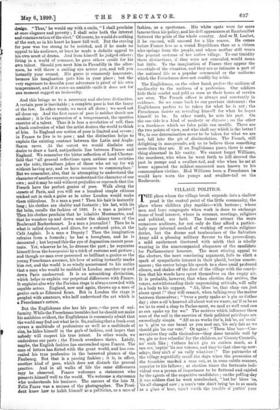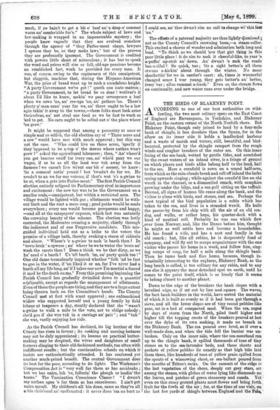VILLAGE POLITICS. T HE place where the village brook expands into
a shallow pond is the central point of the little community, the place where children play marbles—with buttons ; where men and boys congregate when work is done to exchange items of local interest, where in summer, meetings, religious and political, are held. The former attract the mgre numerous audience, for not only do they afford a particu- larly easy informal method of working off certain religious duties, but the drums and tambourines of the Salvation Army add a pleasing military flavour to the proceedings, a mild excitement tinctured with mirth that is wholly wanting in the unaccompanied eloquence of the candidate for Parliamentary honours. The most stirring appeal to the electors, the most convincing argument, fails to elicit a spark of sympathetic interest in their placid, bovine counte- nances; the orator brings his speech to a close amid profound silence, and shakes off the dust of the village with the convic- tion that his words have spent themselves on the empty air. It is probable, however, that when election day arrives, the voters, notwithstanding their unpromising attitude, will rally • in a body to his support. " Ah, bless 'ee, that chap can just about spout !" they will remark, when talking over the matter between themselves ; "Iwur a purty spake as 'e gin us t'other day ; sims a-sif 'e knawed all about wot we wants, an' if so be as we 'as to send a chap to Parlee-ment, we med as well send one as can spake up fur we." The motives which influence these sons of the soil in the exercise of their political privileges are exceedingly simple. "All on us works fur 'e, luk 'ee, an' seem' as 'e gi'es us our bread as you med say, 'tis on'y fair as we should gin 'im our vote." Or again : "Them blue 'uns—Con- servatives they calls theirselves—they done torrable well by we, gin as free schoolin' fur the childern, an' County Councils, an' such like ; fothers ha'n't gin us nuthen much, as I can see, 'ceptin"tis our voteses, and they be that chee-up now- adays, they ain't o' no vally whativer !" The patriarchs of the village regretfully recall the days when the possession of the franchise marked a man out, as in some subtle manner, superior to his fellows ; at election times the fortunate indi vidual was a person of importance to be flattered and cajoled by the agents of the respective candidates ; on the polling-day it was seldom that he went unrefreshed, "but loe bless 'ee, 'tis all changed now ; a man's vote don't bring 'un in so much as a glass o' beer, tain't worth the trouble o' puttin' your mark, if ye bain't to get a bit o' beef an' a drap o' summat warm an' comfeiable fur'n." The whole subject of laws and law-making is wrapped in an impenetrable mystery ; the people know vaguely that they are evolved somehow through the agency of "they Parlee-ment chaps, lawyers I spwose they be, as they meks laws," but of the process they are profoundly ignorant. The Government is credited with powers little short of miraculous ; it has but to speak the word and prices will rise or fall, old-age pensions become an established fact, work be provided for every man. It was, of course, owing to the supineness of this omnipotent, but sluggish, machine that, during the Hispano-American War, the price of bread went up to such a scandalous height. "A purty Government we've got !" quoth one irate matron ; "a purty Government, to let bread be so dear ! wotiver's it about I'd like to knaw, mekin' we paay sevenpence a loaf when we sows 'un, an' ree-ups 'un, an' gathers 'un. There's plenty 9' earn pun' year fur we, an' there ought to be a law agin takin' it away to the towns,—them folks must look arter theirselves, an' not steal our food as we be fast to work so 'ard to get. No earn ought to be selled out o' the place wheer 'un grew."
It might be supposed that among a peasantry at once so simple and so selfish, the old election cry of "Three acres and a cow" would have met with much approval ; but this was not the case. "Who could live on three acres, 'speely if they 'appened to be a-top o' the downs wheer nuthen wun't grow ?" asked the agricultural labourers ; then, "An' wheer'd you get beastes enuff for lye*, one, an' who'd pay we our wages, if so be as all the land wur tuk away from the farmers ? we cassn't live wi'out our bit o' money, 'ee knaw : a comacal notia' yennit 7 but twudn't do fur we. He needn't to ax we fur our voteses, if that's wot 'e's a-gwine to be at, when a gets into Parlee-ment." The first Parish Council election entirely eclipsed its Parliamentary rival in importance and excitement : the new toy was to be the Government on a smaller scale,—omnipotent, but within a restricted area. The village would be lighted with gas ; allotments would be with- out limit and the rent a mere song ; good paths would be made everywhere ; every one would become prosperous and happy, —and all at the ratepayers' expense, which last was naturally the crowning beauty of the scheme. The election was hotly contested, the Moderates securing a majority, chiefly through the indiscreet zeal of one Progressive candidate. This mis- guided individual held out as a. bribe to the voters the promise of a village bath, thereby evoking a storm of ridicule ad abuse. " Wheer's 'e a-gwine to mek 'is baeth then ? In. town-bruk ' a-spwose ; an' wheer be we to water the 'orses an' vrash the merts then? Does a think we be that dirty, as we ha' need o' a baeth? Us 'ull baeth 'in, an' purty quick too ! " One old dame tremulously inquired whether "folk 'ud be fust to goo in the water, if 'un liked it or no, fur I've niver had a bieth all my life long, an' if I takes one now I'm mortial a-feared it med be the death on ma." From this promising beginning the Parish council has gradually dwindled down to a quantite negligeable, except as regards the management of allotments. Even of these the people are tiring, and they are to a large extent being thrown back on the Committee's hands. The County Council met at first with scant approval ; one enfranchised widow who supported herself and a young family by field labour at tenpence a day, stoutly declared that she "wasn't a-gwine to walk a mile to the vote, not to oblige nobody; she'd goo if she wur tuk in a carriage an' pair"; and "tuk" she was, vastly enjoying her ride.
As the Parish Council has declined, its big brother of the County has risen in favour its cooking and nursing lectures may not be duly appreciated ; its lessons on practical butter- making may be despised, the wives and daughters of small farmers clinging to their old-fashioned methods, too often with indifferent results ; but the continuation schools on which it insists are enthusiastically attended. It has conferred yet another much-prized benefit. The central Government does its best for the poor, according to its lights. The Workman's Compensation Act is "very well fur them as has accidenks ; but we has nairn, luk be, follerin' the plough or leadin' the teams." The Vaccination Conscience Clause ? "1 dwun't say nuthen agen 'e fur them as has consciences. I ain't got nairn myself. My childem's all bin done' same as they've all a-bin chris'ened an' confirmated : it never done 'em no hurt as I could see, an' ther dwun't sim no call to change wi this last 'tin?
The efforts of a paternal majority are thus lightly clismissed ; not so the County Council's crowning boon,—a steam-roller.- This excited a chorus of wonder and admiration both long and loud. "To think as we should 'ave that girt thing in this poor little place ! it do sim to mek it cheerful-like, to year 'e a-puffin' up-strit an' down. An' dwun't 'e mek the roads bea-u-tiful ? So quick, too ; a sight better'n all them stwuns a-kickin' about through the winter. No moor shuckettin' for we in carrier's caert : alt, times is wunnerful changed sence I wur young, they gets bettein an' better, ivery 'ear ; alias summat a-fresh." Even so, the stream flows on continually, and new water runs ever under the bridge.







































 Previous page
Previous page